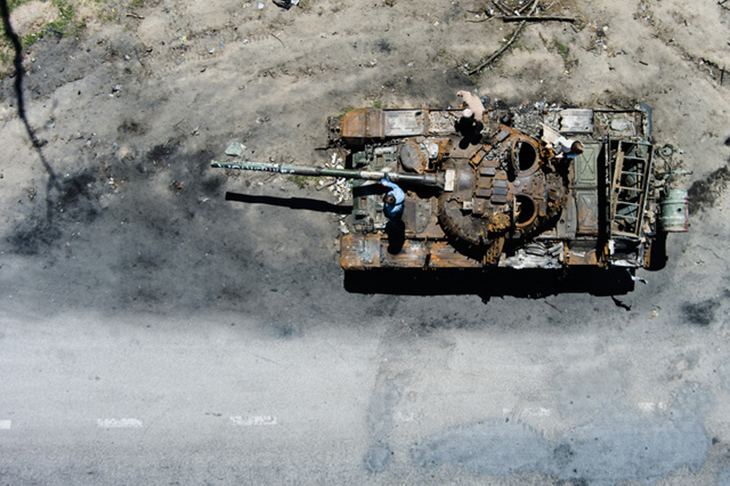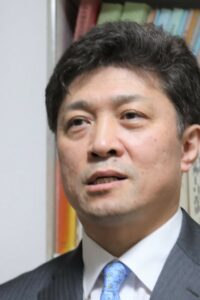How will the war in Ukraine change the New Cold War between the United States and China? — Xi Jinping’s diplomacy of self-reliance and its implications for Taiwan

“The current Ukrainian war is being seen as a Taiwan emergency more and more. […] China is a nuclear state and Taiwan is a non-alliance country for the US, meaning that the US may not intervene in a Taiwan emergency.”
Photo: Kyiv region, Ukraine – May 15, 2022: War in Ukraine. © sarymsakov / PIXTA
President Xi Jinping has shown a clear support for Russia. However, the war situation became mired in a mess beyond expectations, and Western countries united with sanctions against Russia. This has severely narrowed the options for Chinese diplomacy. As the “New Cold War” between the United States and China accelerates, the author examines the impact of the Ukraine war on Taiwan.
Matsuda Yasuhiro, Professor, University of Tokyo
In 2021, China reached for the North Korea and Russia cards after feeling threatened by the Joe Biden administration’s closing in on China. It is in this context that North Korea restarted their full-scale missile launches and Russia invaded Ukraine.
Why has China endorsed the Russian invasion of Ukraine?

Prof. Matsuda Yasuhiro
At the Beijing Olympic Winter Games, Russia was subjected to official sanctions due to doping issues, and even though Russian athletes were unable to participate in the games, President Xi Jinping invited President Vladimir Putin to the Opening Ceremonies. Xi used Putin to counter the diplomatic boycott by the United States, and Putin used Xi to support the invasion of Ukraine from behind.
The China-Russia Summit that took place in conjunction with the Olympic Opening Ceremonies was a milestone. In the Joint Statement of China and Russia announced on February 4, they expressed for the first time that “[the Sides] oppose further enlargement of NATO” and stated that “friendship between the two States has no limits, and there are no ‘forbidden’ areas of cooperation.” This message showed that China shares Russia’s apprehension and that China supports Russia. They signed agreements for China to purchase natural gas from Russia in rubles and paved the way for Russian economic security even if it later took on economic sanctions from the West.
It is difficult to believe that Xi Jinping did not know about the Russian invasion of Ukraine. According to a report by the New York Times based on evidence from a senior US official, the United States alerted China of Russian military movements by sharing classified information three months before the invasion, and asked China to discourage Russia from doing so. The Chinese Foreign Ministry denied this, but shared the US information with Russia and conveyed to Russia that it would not interfere with the Russian plan.
It is possible that the Xi Jinping leadership deemed the Russian invasion of Ukraine to be limited, and a decisive battle ending in Russian success like the past Russian invasion of Georgia. This is suggested by the delayed deportation of the roughly 6,000 Chinese citizens residing in Ukraine.
On top of that, according to an announcement by the Embassy of Russia in China, “Xi Jinping stressed that he respected the actions of the Russian leadership in the current crisis” in a phone call with President Putin on February 25, the day after the invasion began. (Note: This sentence did not appear in announcements by the Chinese Foreign Ministry.) In other words, this means that President Xi not only promised to support Russia immediately before the invasion, but also endorsed the full-scale invasion in a phone call immediately after the invasion began.
China cannot run away or hide. The Spokesperson of the Chinese Foreign Ministry has repeated the same vague remarks practically every day since the invasion began, and Chinese media have continued to report essentially the same content as Russian allegations and reports. It is a situation where the efforts of the propaganda department to justify Xi Jinping’s pro-Russian diplomacy exist alongside the efforts of the diplomacy department to impress upon the world that Xi Jinping diplomacy does not support Russia.
China is in a position where it cannot say whether it knew of Russia’s military movements beforehand or not. If they knew, they would be criticized for not stopping Russia, and on the other hand, not knowing would be seen as a lack of mutual trust between China and Russia. Therefore, the Xi Jinping leadership has no other choice but to support Russia for all intents and purposes by not criticizing Russia, opposing sanctions, and maintaining the normal relationship between the two countries. At the same time, it is thought that China hopes that the image of China being involved with Russia will spread.
China has no other option but to support Russia
If Russia had just applied militaristic pressure to Ukraine and succeeded in a limited invasion, the attentiveness of the United States in closing in on China would have disappeared and this wouldn’t have been bad for China. But it is a different story if Russia fails with a full-scale invasion. Putin has become the world’s worst villain now due to the Russian army’s invasion and acts of brutality. Major countries have begun to cut off their connections to Russia, but China has been faced with the unenviable task of supporting Putin’s war.
Of course, in actuality, the problem is not this simple. If Russia recognizes the independence of the two eastern regions of Ukraine, then the United States could recognize Taiwan’s independence in theory, and China would be bothered if this kind of precedent became possible. Russia has annexed the four oblasts it occupied in eastern and southern Ukraine after two of them became independent, which is why China cannot agree to the annexation of the four provinces and Crimea.
By supporting Russia, China has lost many benefits. Ukraine was an important country in the “Belt and Road Initiative (BRI),” a Chinese militaristic and economic initiative, but it has been discarded. Additionally, China’s relationship with the West has deteriorated considerably in recent years and lately they have worked to improve this, but the goal of improving relations has moved further away.
China faces major contradictions in its support of Russia. In the future (perhaps in a decade), when China undertakes a militaristic reunification with Taiwan, there will likely not be a Russia to rely on. This is because if the Putin administration continues, Russia will be further weakened through sanctions, and if Putin falls from power, the incoming administration should take a pro-Western line to eliminate the sanctions. In other words, China will lose its powerful and reliable support either way.
Even still, China cannot abandon Russia due to its opposition to the United States. China purchases a considerable amount of weaponry from Russia. The best China could do was abstain from voting on the resolution condemning Russia at the UN Security Council and the Emergency Special Session of the General Assembly. The only possibility is if Putin falls from power from within Russia, in which case, there would be no option but to switch to a new leader. In other words, it is hard to imagine China abandoning Putin so long as Russia and Putin are unified.
While China supports Russia, it is also trying to create the impression that it does not. This is why the Chinese government transferred Vice Foreign Minister Le Yucheng, who was a symbol of pro-Russian diplomacy, out of the Foreign Ministry to a new role as the Deputy Director of the National Radio and Television Administration in June. However, when President Putin and Chairman of the State Duma Vyacheslav Volodin met with Li Zhanshu, Chairman of the Standing Committee of the National People’s Congress in Kazakhstan in September, Li conveyed his strong support for Russia. However, the Chinese Foreign Ministry tried to hide this statement. This pattern is likely to continue in the future.
China’s own political system inherently will not waver even when getting close to Russia, but if China gets close to the United States, the dictatorial single-party political system will be eroded and China will be exposed to risks. The greatest threat to national security for the Communist Party of China (CPC) lies in the fact that reform and door-opening policies have continued for 40 years and that there has been an increase in the number of Chinese citizens who consider the Western values of freedom and democracy to be good. The Xi Jinping administration has set forth an overall view on safety that establishes the preservation of the Communist Party system as the main priority, and they have forged ahead with stronger regulations on freedom of speech within China and the expulsion of foreign powers. Opposition to the United States and the close relationship with Russia are the result of Xi Jinping’s strategic decisions in diplomatic policy.
Is today’s Ukraine tomorrow’s Taiwan?
The current Ukrainian war is being seen as a Taiwan emergency more and more. With the US declaration of non-intervention, an opinion poll in Taiwan found that 59.7% of respondents were concerned that Taiwan would have to defend itself in the event of a future Chinese attack (opinion poll by Taiwanese Public Opinion Foundation). Even in Japan, more than 89% of respondents were worried about China’s invasion of Taiwan (opinion poll by the Mainichi shimbun newspaper).
As the rejection of reunification in Taiwan is becoming mainstream, peaceful reunification through negotiations is becoming hopeless. This is why it is believed that China is taking time to strengthen its abilities and has shifted toward a method of forcing Taiwan to reunification against a backdrop of military power. We are looking at Ukraine as a sort of dry run of this scenario. However, Russia was unable to bring Ukraine to its knees with threats and has failed in its attempt at a decisive and short battle. The weapons supplied to the Ukrainian army by the United States and other countries are demonstrating power and the Russian army continues to be consumed by these weapons.
In other words, we have come to see that a large price must be paid when trying to violently change the current state of affairs by force. The Russian economy is expected to suffer a major setback in the future as Japan and the West have come together to exercise powerful sanctions. If we can spin the narrative that the Russian invasion of Ukraine is the beginning of the end for the Putin administration, Xi Jinping will surely need to be cautious about the use of force, even if the Putin administration continues. This is because he feels that the CPC administration may be in danger.
What Ukraine and Taiwan have in common about their environments is that there is the possibility of an authoritarian power changing the status quo through force and a strengthening of the individual dictators in these authoritarian powers. If Putin had not been president, the full-scale invasion of Ukraine would likely not have happened. And with China, if the individual dictatorship of Xi Jinping is further strengthened, there is a possibility of the same thing happening in the future.
However, there are actually more differences than similarities. Ukraine is part of a contiguous, vast plain that includes Russia, while Taiwan and China are separated by a strait of more than 100 km, making it difficult for China to send a large number of ground troops to Taiwan. And different from Ukraine, Taiwan is located within the same sphere of influence that connects it to the United States via the Pacific Ocean, just as Japan and South Korea are, and Taiwan honors the market economy and democracy. To the US, Taiwan has great strategic value in confronting China, which is also Taiwan’s greatest strategic rival.
Anti-Russian sanctions are also a lesson for China. It was considered a huge hurdle to remove a country from the Society for Worldwide Interbank Financial Telecommunication (SWIFT), which handles financial remittance for global financial institutions. However, as the international society saw the brutal Russian acts of aggression and cruelty, the greatest sanctions were realized at once. Even if Russian military movements cannot be quickly stopped through sanctions, major repercussions will occur within Russia in the medium to long term. There will be inflation and supply shortages, there will be many Russians who leave their country in despair over the future, and the regime will be shaken from within. If these kinds of sanctions are taken once, it lowers the bar for the next round of sanctions.
For the CPC, Taiwanese reunification is not the sole national goal, but rather the legitimacy of their authority is based on the Chinese people’s feelings that their lives have improved. The basis for the CPC’s legitimacy is likely to crumble if the lives of its people are made worse through sanctions as a result of reunification with Taiwan by force. And if this reunification by force fails, the government will surely be caught in a dilemma as economic damages will be all that remains.
Taiwan has cause for concern in the early declaration by US President Biden of the avoidance of World War III, that is, a declaration of non-intervention. This means that the United States will not engage in battle against a nuclear state to protect a non-alliance country. China is a nuclear state and Taiwan is a non-alliance country for the US, meaning that the US may not intervene in a Taiwan emergency.
For the United States, there is the “Taiwan Relations Act,” which makes militaristic intervention possible, and in reality, China cannot completely ignore the risk of US intervention. That being said, in an opinion poll conducted in March by the Taiwanese Public Opinion Foundation, the percentage of people believing the US would intervene in a Chinese invasion of Taiwan dropped to 34.5%, down from 65% seen in October 2021. To restore the confidence of the Taiwanese, US House Speaker Nancy Pelosi visited Taiwan in support of Taiwan in August, and President Biden has repeatedly suggested that the United States will defend Taiwan. According to a poll by the Taiwanese Public Opinion Foundation conducted after Pelosi’s visit, the percentage of Taiwan residents who believe that the US will defend Taiwan if China attacks Taiwan has recovered to 44.1%.
The Tsai Ing-wen administration has strongly criticized Russia and ventured into G7-based economic sanctions against Russia. As a result, Taiwan has been recognized by Russia as one of its “unfriendly countries and territories” and has had sanctions imposed. Taiwan’s stance was not ambiguous, but rather it was clearly a G7-leaning decision. Support for the Tsai Ing-wen administration, which continues to take a hard stance against China and Russia, still remains at around 50%, and mainstream public opinion has not necessarily been shaken.
But that is not all. President Volodymyr Zelensky and Ukrainian residents, who have taken up arms to fight to protect their country from the invader, are seen as heroes in the eyes of many Taiwanese residents. In opinion polls by the Taiwan International Strategic Study Society and Taiwan International Studies Association, 70.2% of residents said they would fight for Taiwan in the event of an emergency. And even in an opinion poll by the Taiwanese Public Opinion Foundation, 76.9% of respondents said they support the plan to extend the period of compulsory military service from four months to one year. In other words, we can see that the awareness of national defense among Taiwanese residents has been strengthened through witnessing the Ukrainian war.
The 2021 defense budget in Taiwan was about 453.4 billion NT$ (15.6 billion USD) and was no more than 2.4% of Taiwan’s GDP. At the same time, it will take quite some time for China to block US intervention and build up the military power needed for a full-scale invasion of Taiwan. In other words, there is time to change the future for Taiwan. Direction can be indicated for the future to defend Taiwan, including increasing the national defense budget, strengthening Taiwan’s asymmetric warfare ability, enhancing military reserves, reducing economic dependency on China, seeking international security cooperation, and strengthening the awareness of national defense among Taiwanese residents. President Tsai Ing-wen raised these reforms in her speech at the Double Ten National Day on October 10, 2022. Taiwan’s defense spending is scheduled to increase by 13.9% in 2023 over the previous year, according to the Taiwanese government.
What are China and Russia’s strategies in this New Cold War?
The Ukrainian war, which the world has experienced after US-China conflicts and the COVID-19 pandemic, was a milestone that forced the world to admit that globalization (perhaps called “Inter-Cold War” in the future) was over. The time where one can go anywhere, trade anywhere, and invest anywhere is over.
Remember, Russia needed support from China for the invasion of Ukraine. Ukraine, on the other hand, is rapidly coming under the influence of the United States and resisting Russia. In other words, the “Ukrainian war” is actually a US-China Cold War, and is comparable to the Korean War in the first Cold War. It is the same as both China and the US fighting a proxy war in a third country while avoiding direct confrontation.
Russian attrition and the destruction of Ukraine will likely continue until a ceasefire is agreed upon after Russia reaches a very narrow target where it can declare victory within Russia and can convince its citizens that it was not defeated by Ukraine. The “weakening of Russia” is progressing through future militaristic support in Ukraine, just as US Defense Secretary Lloyd Austin said when visiting Kyiv. However, this must be done in such a way as to not drive Russia to use weapons of mass destruction.
What options should Japan and the international society take while facing this Cold War-style proxy war? Stopping the Russian military invasion tomorrow or overthrowing the Putin administration next month are outside of their control. First, we must make Russia pay a high price through sanctions and spread the narrative both within Russia and abroad that the invasion of Ukraine was the beginning of the end for the Putin administration. Through thorough sanctions against Russia, we must then aim for two results: to discourage China from taking any action in the future to change the status quo by force and to extinguish support for China in taking action in the future to change the status quo by force.
Through the Ukrainian war, the world has seen the horrors of authoritarian states firsthand. Japan should not only strengthen its defensive capabilities but also accelerate its movement towards economic security. Japan, the United States, and Europe should create a framework for cooperation and gather other countries to their side. This is because it is dangerous to be overly dependent on authoritarian states. As a result, it is inevitable that movements towards blocking will be strengthened. While these movements will not progress in a straightforward way, their direction is clear. Additionally, a strategic shift for the economy and security will have no effect if taken on by a single country. Moving forward, it will be imperative to have a G7-centered multi-layered international cooperation system.
Translated and updated from “Ukuraina Senso wa Beichu Shin-reisen wo do kaeruka—Jibaku jiju no Shu Kinpei gaiko to Taiwan jisei heno gani (How will the war in Ukraine change the New Cold War between the U.S. and China? —Xi Jinping’s diplomacy of self-reliance and its implications for Taiwan),” Gaiko (Diplomacy), Vol. 73 May/Jun. 2022, pp. 92-97. (Courtesy of Toshi Shuppan) [October 2022]
Keywords
- Matsuda Yasuhiro
- University of Tokyo
- United States
- China
- CPC
- Xi Jinping
- Russia
- President Putin
- Ukraine
- Taiwan
- China-Russia Summit
- authoritarian states
- anti-Russian sanctions
- New Cold War
- globalization
- Inter-Cold War
- economic security
- G7




